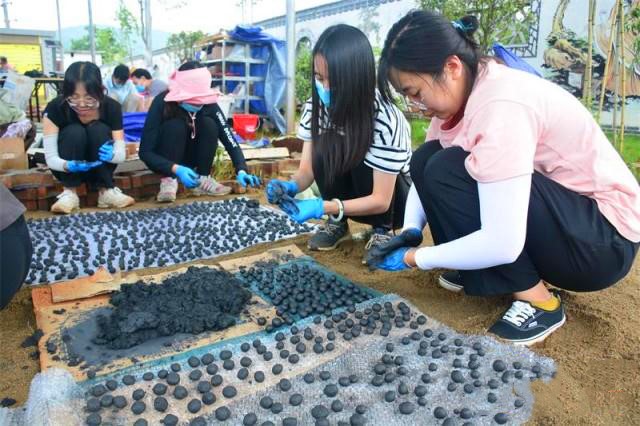College Students Explore Secrets of Millennium Melting in Guiyang County

Recently, more than 90 experts and scholars from 30 universities at home and abroad as well as from many research institutes in China gathered in Chang'an Manor, Huangshaping Street. They were crushing charcoal, preparing ore, and firing blast tubes.
It was understood that from July 8 to 14, Peking University opened a 7-day summer course on Metallurgical Experimental Archaeology in Guiyang County. The course included 3 parts: classroom teaching, field investigation and experimental practice. The experiment was divided into three modules: copper-lead ore smelting, ash-blown silver smelting and silver beating, pig iron and steel making. Through ore separation, construction furnace, blast smelting, silver beating and iron making, they experienced the production process of metal smelting and metal works making, and studied the problems of ancient metallurgical technology and production organization.
"Guiyang County has a long history of mining and metallurgical culture, and this event is to restore the ancient smelting process by using the mining and metallurgical cultural heritage already excavated in Guiyang, and to build smelting furnaces to simulate the ancient smelting technology to extract metals. The course of experimental archaeology is not only a teaching activity, but also a scientific research and cultural activity." Professor Chen Jian, School of Archaeology, Peking University, said.
Xiao Yuqi, a postgraduate of from the Chinese University of Hong Kong, was the third time to come to Guiyang County. During her visit, she visited the Tongmuling mining and metallurgical site in Guiyang twice. She said, "The impression of the countryside was chicken and duck. These two visits to Tongmuling Mining and Metallurgical Site have made me deeply feel the profound cultural connotation of Guiyang City, which is really a worthwhile trip!"
Guiyang County has enjoyed the reputation of "Eight Treasures Land" and "Millennium Mining Capital" since ancient times. Eight Treasures are also gold, silver, copper, iron, lead, tin, crystal and carboniferous. At present, there are 103 kinds of mineral deposits in 11 categories. Among them, lead, zinc, copper, tin and graphite reserves rank first in China. Guiyang has a long history of mining and smelting minerals, and became an important base of metal minerals and coins in China after Tang and Song Dynasties, which reached its peak in the late Ming and early Qing Dynasties. There are dozens of ancient mining and metallurgical sites in the county. Among them, Tongmuling mining and metallurgical site was appraised as "Top 10 New Archaeological Discoveries in 2016 in China".




